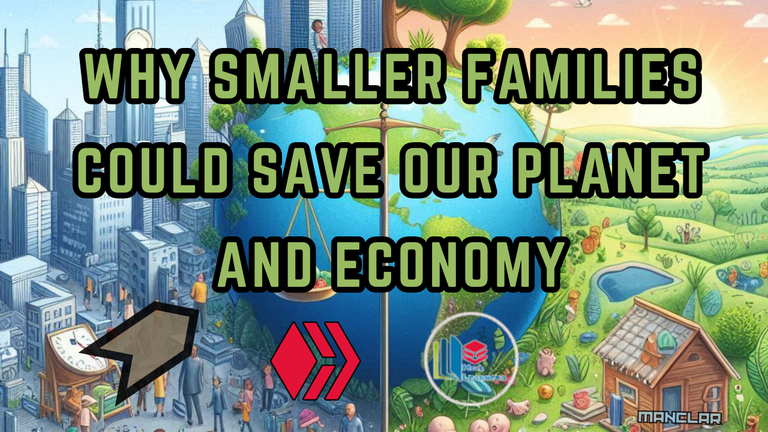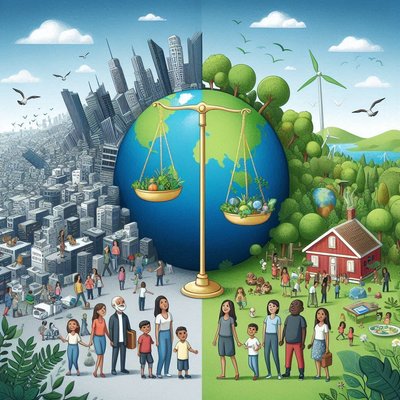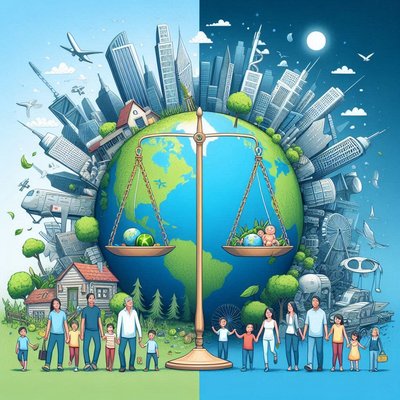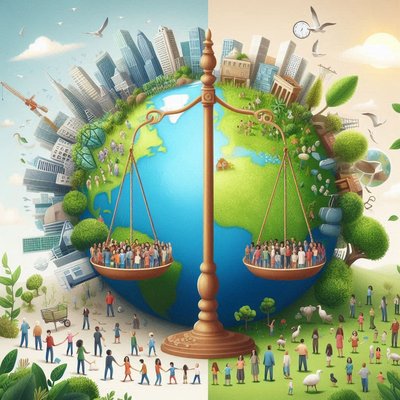Why Smaller Families Could Save Our Planet and Economy

This is a publication based on the suggested topic proposed in the Hive Learners community through their discord, which on this occasion is "Population".
"The greatest threat to our planet is the belief that someone else will save it."
<< Robert Swan >>


Bing AI
Welcome to my blog, usual readers and new visitors to this space. The topic for today is population.
When we talk about this, it is evident to take as a reference the countries that have a large population in the world, such as India, Nigeria, Africa or the United States of North America.
And it is easy to see the problems they have or the number of people they have.
Obviously, being countries with a large number of individuals, the problems they have are an example of how certain policies should be taken and managed.
We must take into account the risks and long-term effects of each of these policies.
To make this analysis, we must take economic, social and ethical considerations.
According to what I have read on the internet, the population is estimated to reach 10 billion people in the world by 2057.
And the problem with this is that it creates an economic instability so that there is sustainability of resources and the allocation of these resources.
So, obviously, this leads to smaller families because the state has to allocate fewer resources.
It spends less money on the allocation of resources in families that are smaller. Not to mention that having a smaller family saves more money.


Bing AI
And I think the new generations are very focused on that.
With such a difficult economy that we have in these times, most countries and most people tend to have the idea in mind of not having children or of having very small families because the cost of living is so high nowadays that the new generations take that path as an option.
Now, the benefits of encouraging smaller families, I think these are evident. They allow economic growth.
The families, having fewer children, will be able to invest more in education and in the health of each child.
So, this happens for the benefit of having more qualified workers, people who have studied because they have been able to have access to studies because the family's economy has allowed them to pay for university for that child or those children.
That, on the one hand, and on the other hand, helps the planet a lot because having a slower population growth means that fewer resources are spent. The ecosystems become more sustainable.
So, we also help the planet by spending fewer resources and also by polluting less because we are going to have smaller families.
This is a topic that must be handled in a delicate way because we also have the aspect of cultural resistance in countries and regions like Ghana or India where the traditional preferences of families are based on having large families.
So, this can be a problem and in order to avoid this, it should be combined with media campaigns and with the education of people in family planning so that these traditions can be carried out and so that they know that having a larger population means that resources are going to run out faster and life is going to be more difficult.


Bing AI
We should also take into account the long-term effects because, for example, if a country decides to pay incentives for the number of children it has, since fewer children are going to be paid with more money, this could temporarily favor birth rates but people could also take advantage of this by having many children.
What they would do is force public funds. By having many children, they would try to get the state to finance this and this should be handled with reforms in education, housing and child care. So, the state should be careful with this.
I believe that the solution to all of this is for education to be integrated and to teach people about family planning and to integrate services so that people are motivated to participate voluntarily and avoid coercive measures.
Maybe this could be a solution, but given the current situation in the countries, I am really not optimistic about it and I don't think this will become possible, but rather a beautiful utopia.
I believe that the solution to all of this is education and going to live in the countryside and being aware that having large families with the current situation of the world and the difficult economy we have in each of our countries is not a good idea to be thinking about stimulating having children and having large families.
Like everything, there has to be a balance and I believe that reducing the population in the long term will bring us more benefits because we will have more natural resources, we will have more abundance of resources all over the planet and we will be able to live better.
But of course, this is only my mentality and my way of thinking.
And as always, I am still a minority that is not taken into account and will hardly be taken into account in the future.
But I prefer to remain a minority and think differently from what other people think.

This is my black cat "manclar", this account is to honor his dead (it happened years ago).

Visit the Neon Strike discord, the game of the future today!
 (Discord)
(Discord)
Credits:
Thumbnail image maded using Bing AI and edited with Canva.com
The text dividers were made by me using aseprite
Post translated from spanish to english using Deepseek AI
To be frank, one of the problems we have in the world is overpopulation. Pressure is too much on something even the government. There are limited resources with so many people wanting to benefit
Too many people, little education (and little intention of people to educate or improve) and shortage of resources. The perfect recipe for extinction.
This post has been manually curated by @bhattg from Indiaunited community. Join us on our Discord Server.
Do you know that you can earn a passive income by delegating to @indiaunited. We share more than 100 % of the curation rewards with the delegators in the form of IUC tokens. HP delegators and IUC token holders also get upto 20% additional vote weight.
Here are some handy links for delegations: 100HP, 250HP, 500HP, 1000HP.
100% of the rewards from this comment goes to the curator for their manual curation efforts. Please encourage the curator @bhattg by upvoting this comment and support the community by voting the posts made by @indiaunited.
Thankyou batman! 😃
!PIZZA
!PIMP
$PIZZA slices delivered:
@manclar(1/5) tipped @indiaunited
Come get MOONed!
Hi @manclar, the publication is very interesting, it is clear that the Earth does not have the capacity to accommodate an infinite population..., but the question is whether this prospect of population increase is realistic... the data I have is that the population of the planet is falling, Interestingly some say it is because of education.... as you also raise. We will see if this reduction in population brings more benefits to humanity or inequalities will continue to grow.
A big hug.
I don't know, and I think we are not going to live enough to find out if the population reduction will improve things. In any case, as long as there is no education reduction, things could not get worse.
Personally, I am not worried about what is to come, because our age does not allow us to live what is to come. The younger generation will have to see how to solve their problems.
What I am sure of is that if, as now, the wealth is taken by a minority and their friends, in those networks of friendship between the powerful and their lackeys, and the good work of people with good ideas and a desire to contribute to society is not rewarded, the only thing that can happen is that poverty and mediocrity will abound.
We have examples like Venezuela, and I would say that all countries in the world follow this path: both “liberals” like Milei and “socialists” like Maduro.
Many years ago, many years ago, Schumpeter warned of the trinumph of monopoly, what he, who was a liberal, called the inevitable “trinumph of socialism”. A place where there is no competition and wealth always stays in the same hands. We have already seen that this does not work, will the young people dare to put an end to this? well, that is my question...
If they are the mafias in which the "palabras1" and their people are desired, surely we will not have a beautiful future.
I invite you to read the comments in this post, which Pablo1601 directly does and the face that is the author of the publication ... Do not miss it.
And it is precisely with shit elements like that of this post, that the world or web 3 has no future.
https://peakd.com/hive-145796/@palabras1/sfomtswf
By the way, the same thread to which the publication belongs to the Spanish that we already know that they are part of encouragement ... so that people do not see it, after many truths sang, including that they abuse the healing with their 5 accounts ... and did not answer, evade them, hides themselves as the scoundrel that is.
You know I have no interest in Hive's internal wars, although I have my opinion (there's too much socialism in Hive, or too many friendship networks, call it what you will) here I'm just a corpse waiting to be buried with a big smile on my face. But I'll take a look at the publication. And I thank you for giving me the link.
If i know, but i cannot avoid reignrring to excrement When you mintion it, and it is important that you know, thatyoneyone Who is curious to look at the reality of that character.
You talk a lot about death lately, you make me think that it is time, if so, you know you should let me know to have a beer.
I'll let you know, without any doubt dying drunk seems to me a worthy way to die considering the moral level of the planet.
It is a good way to die, without learning that you are dying! I hope my death is like that, I don't want to find out anything.
I just mentioned that, it already happens in country that governments helps depending of the number of kids that a family has... In south America Brazil do that , and here in Canada much more.
It is a subject, because they will always seek to take advantage of it, so I think education is important, that people know that having children spend faster the resources of the planet ...
Here in Canada we are having a problem with refugees. They bring 4, 5 kids and the government support them. They keep being supported and some even don't try to get work so they would lose the benefit.
Terrible, the saddest thing is that the government allows them to live from them. In that sense, I support Trump's politics, who really contribute something to the country, who work.